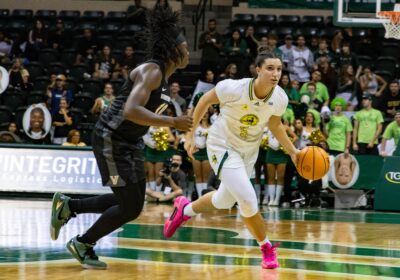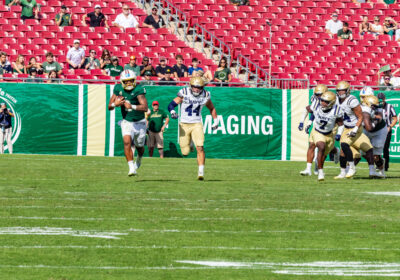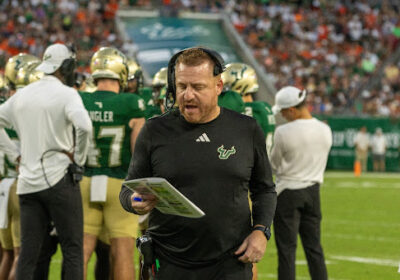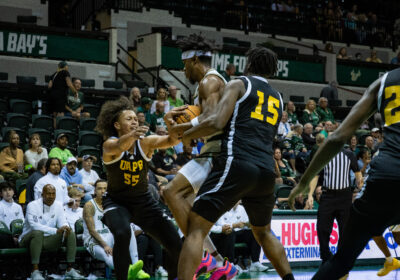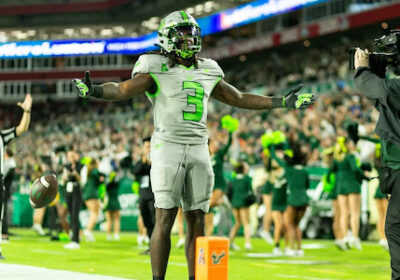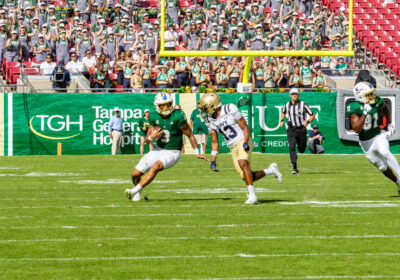USF’s Antigua is in favor of one-year wonders

In USF coach Orlando Antigua's five seasons at Kentucky, the Wildcats sent 29 players to the NBA, 15 of which were freshman. ORACLE FILE PHOTO/ ADAM MATHIEU
The discussion of one-and-done athletes is one of the more polarizing topics of college basketball that circulates this time of year.
As the March Madness confetti settles, young athletes — some not even 20 years old — make the decision to stay in college or pursue an NBA career.
The idea of athletes using college programs as pit stops during their journey to the NBA is a cause for concern for some, while others see it as the player’s right to pursue a professional career after just one year at the collegiate level.
USF men’s basketball coach Orlando Antigua, who spent five seasons at the University of Kentucky churning out lottery picks as an assistant to John Calipari, is in favor of the latter.
“I think if they have the talent and the ability to go straight to the pros, they should be allowed to,” Antigua said, who helped produce multiple draft picks at Memphis.
“At that point, they’re able to make some really important decisions — they’re able to vote, they’re able to represent their country in the armed forces — so they should have the opportunity to work and play in the NBA.”
During Antigua’s stint with the Wildcats, Kentucky had 29 players selected in the NBA draft — 15 of whom were freshman. Some recent notables include three-time NBA All-Star point guard John Wall (No. 1 overall, Washington Wizards), All-NBA first-team center Anthony Davis (No. 1 overall, New Orleans Pelicans) and last year’s No. 1 overall pick Karl-Anthony Towns of the Minnesota Timberwolves.
Antigua also coached Sacramento Kings center Demarcus Cousins, brother of current USF center Jaleel Cousins while at Kentucky.
There’s no question that the one-and-done system has produced some of the best talent in the NBA, and though skeptics will persist that programs like Kentucky are bad for college hoops and its players, the numbers show otherwise.
According to a Sports Illustrated article analyzing the success of Kentucky’s one-and-done products compared to other schools, Kentucky-bred players had exceptionally better numbers in career player efficiency rating (14.8 compared to 11.7), value over replacement (3.9 to 1.0) and win shares (10.8 to 5.9) since 2010.
Above all else, the relationship between top talent and its school is symbiotic. The schools enjoy the increased revenue brought in by high-profile players, and the athletes get their careers propelled toward a chance at NBA stardom.
More often than not, in Antigua’s eyes, it’s in the player’s best interest to leave school early.
At a Glendale hotel, following Memphis’ 2009 Sweet Sixteen loss to Missouri, Antigua, along with Calipari, pulled guard Tyreke Evans aside hours after the Sporting News Freshman of the Year poured in 33 points.
“I said, ‘well kid, there’s nothing left for you to do in college. It’s been great coaching you,’” Antigua joked. “And he was like, ‘what? What do you mean? What are you talking about?’ I said, ‘yeah, you’re not coming back next year.’”
Evans is currently with the Pelicans after a stint with the Kings, where he was named NBA Rookie of the Year.
One of the primary aspects in making this life-altering decision, past the fame of being an NBA hot shot, is the money that accompanies it.

Pelican power forward Anthony Davis was arguably the top talent of Antigua’s stint at Kentucky. The Wildcats finished undefeated, winning the national championship in Davis’ only year. SPECIAL TO THE ORACLE
Based on the 2015 draft, the average yearly salary for an NBA lottery pick (picks 1-14) is around $3.39 million, with top pick Towns earning $5.81 million, according to Forbes.com.
“If your son has an opportunity to go and make six, seven or eight million, why is he going to school?” Antigua said. “You’re going to school to get educated so you can put yourself in position to have a really good job and so you can take care of your family. These kids are getting an opportunity to do that in a sport that they love.”
But what goes into evaluating a player for the next level? Antigua said that’s up to the NBA scouts.
“They all could benefit (from staying), but whether they’re ready or not all depends on the team that’s evaluating them and taking them,” Antigua said. “Could they benefit? Absolutely, they benefit from getting better educated, becoming physically more mature, their game evolving and developing, but that’s for the NBA to decide.”
As a coaching staff, Antigua said, all you can do is provide the player with as much information as possible and let them decide.
“What information can we gather for them to help them make an educated decision?” Antigua said. “(Calipari) works probably twice as hard as he does recruiting them as he does getting information for them and their families so they can make an educated decision on whether they should pursue or should return. It’s a family decision.”
For some players, like Orlando Magic power forward Aaron Gordon — a 20-year-old, one-and-done product of the University of Arizona — that decision isn’t hard at all.
In an interview with the Orlando Sentinel, Gordon praised the system and added that college isn’t for everyone, including him.
“I love exactly where I’m at right now. This is my dream: to play in the NBA, to play against the best in the world and I get to do it on a daily basis,” Gordon said. “My dream was never to play college basketball. My dream is to do this and I’m doing it.
“I think college is good for opening your eyes to another experience and a better level of play. But if you don’t take college seriously, it really doesn’t do anything for you.”

